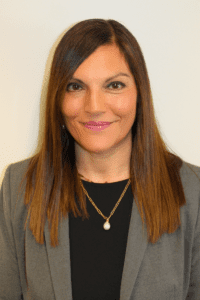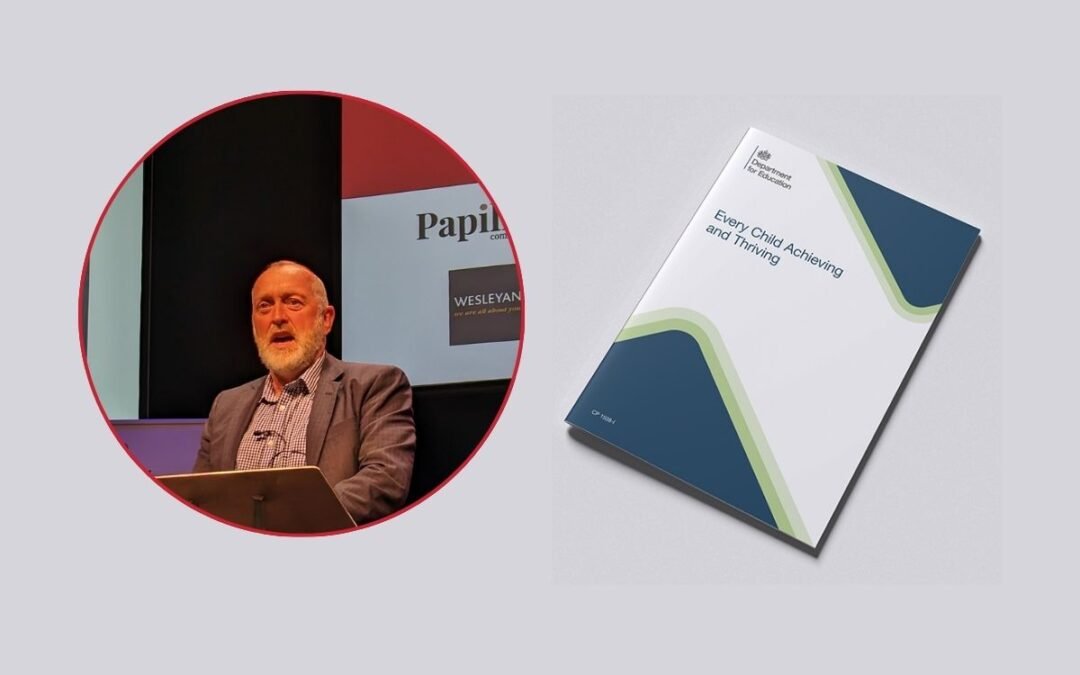The #BeingTheCEO programme is a programme for aspirant and serving CEOs who are keen to further their development in, and understanding of, the CEO role. Participants benefit from the time, space and resources to reflect deeply on the role, guided by experts. The programme is led by Michael Pain, author of the seminal book, ‘Being The CEO’ and founder of Forum Strategy, together with Sir Steve Lancashire – one of the country’s most experienced former trust Chief Executives. Being The CEO is a truly independent programme, based on the input of leading thinkers and CEOs in the third-sector, business, and education sectors. The application round for the tenth cohort of the programme is open until 31st May 2024.
 Lisa Fathers is the Deputy Chief Executive Officer of Bright Futures Educational Trust and began the Being the CEO programme in Summer 2023. In the following interview she shares her reflections on her development as a trust leader and more specifically, the learning she’s taken from the programme that other trust leaders might also find helpful
Lisa Fathers is the Deputy Chief Executive Officer of Bright Futures Educational Trust and began the Being the CEO programme in Summer 2023. In the following interview she shares her reflections on her development as a trust leader and more specifically, the learning she’s taken from the programme that other trust leaders might also find helpful
Tell us a little bit about yourself. What inspired you to become a trust leader, and where are you currently on your leadership journey?
I began my professional journey as a teacher, and my journey evolved through taking on various leadership roles within schools, before entering into the ever more strategic domain of trust leadership. I’m currently the Deputy CEO of a medium-sized academy trust, also overseeing Teaching School hubs, School Centred Initial Teacher Training (SCITT), Maths hub, and Early Years hub – working at scale with hundreds of schools. I’ve also had a number of system leadership roles and I’m currently a National Leader of Education (NLE). Adding to this I have undertaken many governance roles, serving as a board member on several boards, as a trustee on an academy trust board, and recently securing the role of Chair of trustees on an academy trust board.
My leadership journey has been so enjoyable and varied ; it has helped to shape my understanding of collaborative system leadership, which I believe is fundamental to running a successful trust. My passion lies in becoming the CEO of an academy trust, hopefully in the near future, and this is driven by a desire to amplify my impact on children’s lives at an even greater scale.
How important do you think professional development is in education, and in particular, for leaders across education?
Professional development is at the heart of any effective organisation, whether it’s a trust, a school, or a business. I see it as an investment in people, enabling them to be the best versions of themselves. When individuals feel valued and invested in, they go the extra mile.
For trust leaders, it’s crucial to model prioritising professional development not only for the team, but for oneself too. And I think that goes beyond formal training courses; it should also include staying up-to-date with sector changes, reading relevant books, engaging in webinars, and collaborating with peers at a similar level.
What inspired you to apply for the ‘Being the CEO’ programme, and why was this programme the opportunity you opted for?
I’m at a stage in my career where I’m hoping to become a CEO soon, and I wanted to ensure that I’m well-prepared. Initially, it was the thinkpieces from Forum Strategy that caught my eye; I found them incredibly useful, reflective and well-constructed. It was through those that I stumbled upon the ‘Being the CEO’ programme. What appealed to me most about the programme, and what set it apart from others, was the high calibre of colleagues involved in its delivery, and the brilliant design, offering various opportunities for collaborative learning and reflection. I also really value the cross sector working, this has been an area of great learning for me.
How did you feel when you first started the programme? What was your first experience of the programme?
My first experience of the programme was the residential, and I felt the typical mix of excitement and nerves when you’re about to enter a room of strangers! However, I received a very warm welcome, and I found the atmosphere and the environment both supportive and empowering.
It was an enjoyable and thought-provoking experience, making me think hard about the nature of the trust I aspire to lead, and what that means for me. It was an immersive start that demanded focused thinking and challenged me to grapple with fundamental questions around leadership.
The first residential was also invaluable for me in creating a new network of colleagues at similar career stages – CEOs, deputy CEOs, and other trust leaders. The diversity in this network, which represented many different types of trusts and individuals from diverse backgrounds, made it incredibly valuable. It became a space for sharing both advice and best practices.
All in all it was a very positive experience, marked by extensive learning and collaborative efforts, and definitely contributing towards my growth as a trust leader.
How have you found the content and materials on the programme?
The content and materials have been excellent. The thinkpieces, pre-reading, group discussions, and the Being the CEO book have all become go-to resources for me. I also find Michael Pain’s framework for the CEO role, based on the pillars outlined in the Being the CEO book, an extremely useful way to think about trust leadership.
The site visits to other academy trusts added another layer of richness to the learning experience. Other MATs have welcomed scrutiny and challenge, and also healthy debate around leadership and internal structures. It was really refreshing to be able to immerse ourselves in the workings of another trust, see how it worked up close, and even discuss and debate what could potentially be done differently.
What has been the difference between the mentoring with Sir Steve and the coaching with David Horn? How have you benefited from each element?
I’ve been fortunate to have two really experienced and highly credible colleagues guiding me through coaching and mentoring. The coaching has been incredibly useful in terms of providing a dedicated space for reflection and growth, whereas the mentoring has offered insights into more specific aspects of the trust leadership role. This dual approach has proved invaluable in my professional development.
How have you found the peer-to-peer elements of the programme?
The network we have established on the programme is a really vibrant and supportive one, and we offer each other both challenge and support. It also offers a diverse range of perspectives due to the varied contexts and geographical areas represented in the network.
When you’re a trust leader, your network often consists solely of other local trust leaders; however, this programme has altered that dynamic, providing us with a national network. This broadened network allows for a wealth of diverse thought, and the quality of our conversations is enriched by this.
For me personally, mutual support and championing one another have defined this aspect of the programme.
Has the programme had an impact on you and your trust, and if so, in what ways?
Absolutely. The programme has better equipped me in my current role as Deputy CEO, and has made me more strategic. I feel the programme has given me space to think about what effective trust leadership really looks like and to compare and contrast different models at scale of school improvement, and this has hugely impacted on my strategy planning in my own trust. It has also prompted the trust to revisit what constitutes a thriving trust, and to reflect on our trust strategy, in order to work in a highly effective way at all levels. It has also provided an opportunity to re-evaluate how we communicate our trust vision into a leadership narrative that resonates with everyone.
What have been the key takeaways for you from the programme?
The importance of staying deliberately strategic and maintaining clarity of role have been key takeaways. The importance of strong governance also became even more apparent, leading me to successfully apply for the role of Chair of a trustee board.
One of the things that I’ve most valued about the Being the CEO programme is the range of contributors, and I have learned so much from contributors who come from beyond the education sector. I think that cross-sector learning has been crucial – because the world of education can be quite insular – and during the programme we were exposed to a broad range of thinking and scope.
Would you recommend the programme to others, and if so, why?
Yes, I would, and in fact I already have! It’s a high-quality programme with thought-provoking content, and it’s led by really credible people. The content is fully aligned with being a thriving trust and the thriving trust principles, and the framework which is shared for being an effective academy trust CEO is one that is incredibly user friendly.
As you move into trust leadership, I also think investing in your own professional development becomes even more crucial, and taking part in the Being the CEO programme commits you to accessing the very best resources, and creating the time and the space necessary, to ensure your own professional growth.
Any advice for other trust leaders?
Invest in networks and partnerships, as collaboration underpins effective trust leadership.
Secure a good coach, not just during the Being the CEO programme but beyond, because leadership coaching is incredibly useful.
Lastly, deliberately learn from other sectors – be it health, business, or beyond, because diversifying your learning sources is invaluable.
WOULD YOU LIKE TO APPLY TO BE PART OF THE PROGRAMME?
The application round for the twelfth cohort of the Being The CEO programme is now open: Being The CEO – MAT CEO Training Programme | Forum Strategy ; and closes on 19th June 2025.


